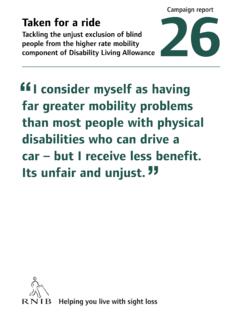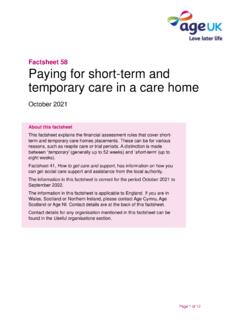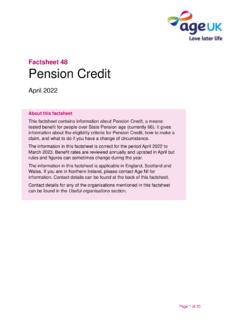Transcription of Benefits, concessions and registration - RNIB
1 Starting Out benefits , concessions and registration About this guide If you are losing or have lost your sight, there is practical and financial support available to help you. A lot of this help, such as being able to claim for a wide range of concessions , is available once you register your sight loss. Your sight loss will need to be certified by an ophthalmologist (hospital eye doctor). registration follows on from this and is a way of letting your local authority know you need help. Certification is also useful for you to prove to other organisations that you're blind or partially sighted.
2 There are two levels of certification and registration : severely sight impaired (this used to be called blind ), and sight impaired (this used to be called partially sighted ). This publication contains information on welfare benefits to which you may be entitled, concessions , certification and registration . If you have a query about something that hasn't been covered in this publication, please get in touch with us. We're ready to help, just give us a call or drop us an email. RNIB Helpline: 0303 123 9999.
3 2. Contents 2 About this guide 4 Summary of concessions and benefits 6 Welfare benefits 24 Tax allowances and reliefs 28 concessions 35 Certification and registration 43 Can I get any other help along the way? 45 Further information 48 Appendix Understanding the results of your CVI. 3. Summary of concessions and benefits This is a summary of the benefits and concessions available to you if you are registered severely sight impaired (SSI) or sight impaired (SI). Entitled to Benefit/ concession SSI SI.
4 Blind person's tax allowance . Television licence fee reduction . Blue Badge Scheme car parking . Free postage Articles for the blind . Free NHS eye examination . Disabled Persons Railcard . Free or reduced bus travel fare . Free directory enquiries . Cinema pass for carer . Protection under the Equality Act . Assessment by social services . 4. May be entitled to Benefit/ concession SSI SI. personal independence . Payment (PIP). Attendance Allowance . Carer's Allowance . Employment and Support Allowance.
5 Tax Credits . Housing Benefit . Council Tax Support (or Housing . Benefit rate relief in Northern Ireland). Council Tax disability reduction (or Disabled Person's Allowance . in Northern Ireland). Universal Credit . Pension Credit . Free ticket for a guide at theatres, . galleries or tourist attractions Please note that the information in this publication is for guidance only and is not an authoritative statement of the law. 5. Welfare benefits There are some benefits that you may be entitled to, subject to age and other circumstances.
6 Being registered as severely sight impaired or sight impaired does not mean you are automatically entitled to any welfare benefits , and there's no special benefit or pension for people who are registered. You do not have to be registered to receive benefits . The key change has been to replace various means-tested benefits , referred to as legacy benefits ', with Universal Credit for people aged 16-64. If you are a new claimant to means tested benefits you will have to make a claim for Universal Credit.
7 The only exception to this is people with three or more children, who can continue to make a new claim for a legacy benefit' until 31 January 2019. If you are already receiving any of the affected older legacy benefits , you will eventually be moved over to Universal Credit. The government aims to start this process from November 2020. but this time frame is subject to change. 6. Call our Helpline if you would like any advice on applying for benefits , or to find out what you might be entitled to. We can provide advice based on your circumstances and carry out a benefits check.
8 We also have detailed factsheets on the different benefits you might be eligible for, and you can call our Helpline to request your copy. Although we cannot guarantee your entitlement, we recommend that you apply for the appropriate benefit. If you don't claim, you won't get anything! 7. If your benefit application is turned down If you have applied for a benefit but are turned down, you should seek advice about requesting a review of the decision. This review is called a Mandatory Reconsideration and should be made within one month of the decision date.
9 If you are still not satisfied after the reconsideration, you can lodge an appeal. Our factsheet on benefits Appeals has information on how to appeal. Call our Helpline to request the factsheet or if you would like to speak to one of our advisors regarding help with challenging a benefit decision. personal independence Payment (PIP). Help for disabled people with the extra costs of a disability PIP has replaced DLA for people aged 16 64 years old. PIP is awarded to help with the costs of daily living needs and mobility needs resulting from an illness or a disability, including sight loss.
10 It has a daily living component and a mobility component. You may qualify for either the standard rate or the enhanced rate of one or both components. 8. A PIP claim involves going through an assessment that uses a points-scoring system to determine entitlement. The PIP. assessment involves an independent health care professional looking at your application, and deciding what information is required from medical and other professionals who know you, or if further information is required from you. You are likely to be asked to attend an assessment with an independent health care professional, after which a report will be sent to the Department for Work and Pensions (DWP).





